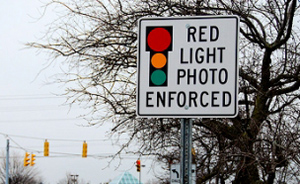
(Photo: gsbrown99/Flickr)
While the state collects millions of dollars from red-light cameras at intersections, a few California cities are starting to question whether the safety benefits are worth the high cost to their own coffers.
Loma Linda is the latest city to drop their red-light camera program. "Ding dong, the witch is dead," Mayor Rhodes Rigsby told the Redlands Daily Facts after the city ended use of the cameras. Rhodes has been a vocal opponent of the program, calling on San Bernardino and Los Angeles to follow this lead.
Over the last five years, Loma Linda brought in around $200,000 from the project, the paper reported. But the bulk of the ticket fines went to the state or to Redflex, the Australia-based company that operates the cameras. "For that $200,000, we took $15 million out of the local economy" in ticket fines, the Daily Facts quoted Rigsby as saying.
Whittier shuttered its program in November, choosing not to renew its contract with Nestor Traffic Systems, citing no improvement in traffic safety and declining revenue, the Whittier Daily News reported.
Because of a state law passed in 2004, renewing the contract would have meant paying Nestor a flat fee instead of a percentage of each ticket - not a good deal for the city, Whittier interim Police Chief Jeff Piper told the Daily News.
Anaheim voters have also turned off their red-light cameras, voting in November to ban them and other automated systems. The measure passed by an overwhelming 73 percent.
"Anaheim's voters recognized that red-light cameras are not a proven deterrent to traffic violations or traffic accidents, and I happen to agree with that assessment," Mayor Curt Pringle told the L.A. Times.
Other cities have rejected automatic ticketing programs as well, including Union City near San Jose, Yucaipa and Costa Mesa, Cupertino, Compton, El Monte, Fairfield, Fresno, Fullerton, Indian Wells, Irvine, Maywood, Montclair, Moreno Valley, Paramount, Rancho Cucamonga, Redlands, Roseville, San Carlos, Santa Fe Springs, Santa Maria, Santa Rosa and Upland.
The backlash is not just in California. Recently, Houston also passed a ballot initiative putting an end to red-light cameras. The Houston Police Department and many city council members support using the cameras, but they're in the minority.
"All they talk about is the money shortfall. They aren't talking about how many lives have been saved. They are not talking about how many accidents have been reduced. They are only talking about one thing and one thing only and that is what it is always about, it always was about the money," Michael Kubosh, with Citizens Against Red-light Cameras, told local reporters.
In Los Angeles, City Controller Wendy Greuel released a report [PDF] saying the city's red-light camera program is actually costing the city money:
"Our audit disclosed that the (red-light program) has not provided additional revenue to the city. Because the city's share of citation revenue is only about one-third of the fine amount, and many citations are either never paid or adjudicated without a payment due, we found the city received only $2.3 and $3 million from the (program) during 2008 and 2009, respectively. When compared to a conservative estimate of the costs incurred by the city to implement the program, the (program) actually cost the city approximately $1.5 million in 2008 and $1 million in 2009."
Of the $446 ticket drivers receive, only $157 goes to the city while the county gets $74 and the state $215, according to Greuel's report. On top of this, many tickets are never paid, party because failure to do so does not result in a suspension of license but also because 67 percent of tickets were mailed to people making legal right turns on red.
Greuel's study found no improvement to traffic safety due to the program.
Studies in Arizona [PDF], New Mexico [PDF], and Canada [PDF] have gone further, finding that red-light cameras can actually cause accidents because drivers often stop abruptly to avoid a ticket, leading to rear end collisions.
Back in Loma Linda, similar statistics proved the demise of the program. Eighty percent of the traffic tickets produced by the cameras were for legal right turns on red.
"I believe these red-light cameras are ways for city governments to legally extort money from their citizens," Mayor Rigsby told KABC.











